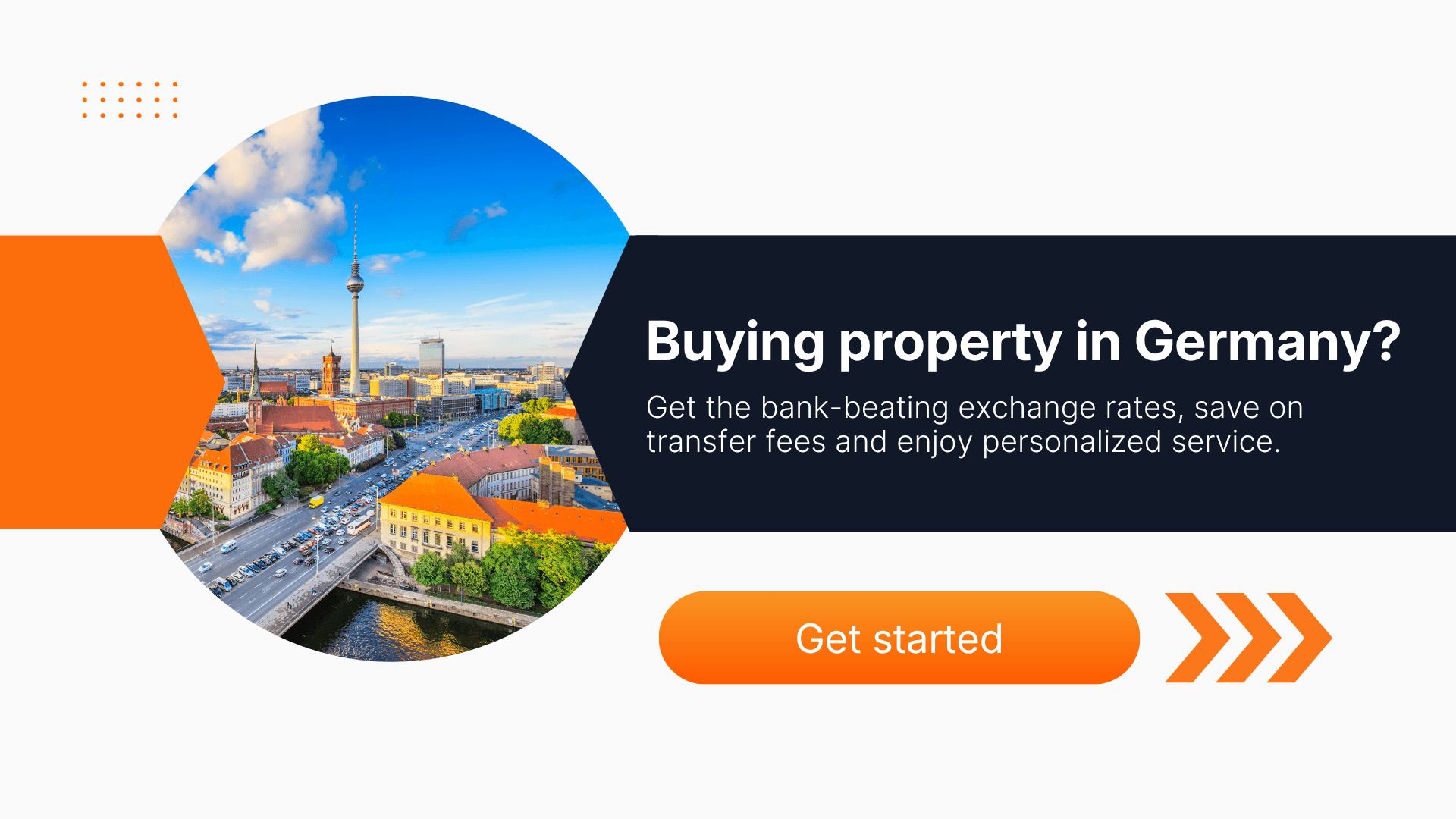Guide for Canadians Buying Property in Germany
Buying property in Germany from Canada? MTFX makes international real estate payments easy and cost-effective by converting CAD to euros (EUR) at better-than-bank exchange rates. Send large, secure transfers directly to German notare (notaries), escrow accounts, or developers—whether you’re purchasing an apartment in Berlin or a home in Bavaria. Track rates, optimize timing, and complete your property purchase with confidence using MTFX.
The picturesque landscapes of Germany, with their allure of historic cities, lush countryside, and the promise of a different lifestyle, draw a growing number of Canadians to the European real estate market. One of the critical hurdles in the house-buying process is managing international payments and dealing with the complexities of foreign exchange. The exchange rates between the Canadian dollar and the Euro can fluctuate significantly, affecting the total cost of the property and ongoing expenses. Additionally, international transactions often come with fees, which can add up and impact your budget.
This blog will help you understand the different aspects of buying real estate in Germany, including the challenges related to international payments and EUR/CAD currency exchange. We will help you make informed decisions that save money and avoid unnecessary complications in your journey to owning a property in Germany.
Can you buy property in Germany without being a citizen?
Yes, foreigners can buy property in Germany without any restrictions related to citizenship or origin. Buying a property in Germany as a foreigner requires you to follow some simple steps, as non-EU citizens, including Canadians, face no legal limitations on property ownership. You don’t need to be a resident or hold a specific visa to purchase real estate in Germany, making it an accessible market for foreign investors. However, it’s important to note that owning property in Germany does not automatically grant residency rights. If you plan to stay for extended periods, you’ll need to obtain a separate residence permit.
For Canadians, purchasing property in Germany can be an excellent investment, whether it’s for personal use, as a vacation home, or as a rental property to generate income. The German real estate market is known for its stability, and foreign investors are welcome to participate in the market, taking advantage of the country’s robust legal framework protecting property rights. When planning to buy property overseas, it’s crucial to consider fluctuations in exchange rates, as they can significantly impact the total cost of your investment. Choosing a reliable money transfer platform with competitive rates and low fees can help ensure your funds are transferred efficiently and cost-effectively.
Benefits of owning property in Germany
Buying property in Germany is a smart decision for many reasons. Here are some of the key benefits.
High-quality construction: German properties are renowned for their high-quality construction standards. This means the property will likely require fewer repairs and less maintenance over time, contributing to its appeal for both locals and foreigners, like Canadians in Germany. The superior building quality also ensures longevity, preserving property value and enhancing its attractiveness to potential renters or future buyers.
Stable investment: Germany's real estate market is known for its stability and reliability, so buying a flat in Germany is a safe bet for Canadians. The country's strong economy and political stability contribute to this aspect, providing a solid foundation for long-term investments. Additionally, Germany’s steady property market growth offers investors a more predictable path toward capital appreciation.
Capital appreciation: While the property market in Germany is considered stable, many areas, especially in major cities and desirable locations, have seen consistent capital appreciation over time. This means that the value of the property you purchase will likely increase, offering the potential for significant returns on investment.
Rental income: Germany's rental market is robust, with a high demand for rental properties due to the country's large population of renters. This opens up the opportunity for property owners to generate regular income by renting out their properties. Furthermore, Germany's tenancy laws are designed to protect landlords, ensuring that rental income is secure.
Diverse market: Germany offers a diverse real estate market, from urban apartments in dynamic cities like Berlin and Munich to quaint cottages in the Bavarian Alps or along the Baltic coast. This variety means investors can find properties that fit various preferences and investment strategies. Additionally, the wide range of property types and locations allows buyers to tailor their investments to align with lifestyle goals or potential rental income opportunities.
Beyond these benefits, it’s important for Canadians planning to invest in German real estate to consider how to send money from Canada efficiently. Working with a trusted foreign exchange provider can help secure favourable rates, reduce transfer fees, and ensure your funds arrive safely, making the process of buying property in Germany smoother and more cost-effective.

Best places to buy a house in Germany
When considering a property for investment or a vacation home in Europe, Canadians often seek areas that offer a blend of scenic beauty, cultural richness, and accessibility. Everything that Germany offers. Whether you’re buying a flat in Germany or a house, several cities and regions stand out as ideal choices for international buyers. Here's a look at some top locations to consider when exploring house prices in Germany:
Berlin
You can easily search for apartments to buy in Berlin, Germany, based on your needs and preferences. As the capital city, it is rich in history, culture, and nightlife. Known for its art, music, and innovative start-up scene, Berlin is a creative hub, making it an attractive spot for those who enjoy a vibrant urban life. The diverse neighbourhoods also mean you can find many properties, from modern apartments to historic buildings, providing options for any lifestyle. For Canadians wanting to buy property in Europe, Berlin offers a dynamic mix of investment potential and cosmopolitan living.
Munich
Known for its beautiful architecture, lush parks, and the famous annual Oktoberfest, Munich offers a perfect blend of traditional Bavarian culture and modern amenities. House prices in Munich tend to be higher due to its popularity and economic strength. Still, the proximity to the Alps makes it ideal for nature lovers and winter sports enthusiasts. Buying a flat in Germany in Munich offers access to a high-quality urban lifestyle with scenic surroundings.
Hamburg
This picturesque port city is celebrated for its maritime charm, beautiful lakes, and green spaces. With a high quality of life, Hamburg is less touristy than other major German cities, making it an appealing option for those looking to immerse themselves in a more authentic experience. If you are wondering how to buy land in Germany fast, especially here, hire a local agent.
The Rhine Valley
If scenic beauty and a slower pace of life are your priorities, the Rhine Valley—with its picturesque landscapes, lush vineyards, and historic castles—could be the ideal choice. Towns like Bacharach, Koblenz, or Bingen provide the charm of rural Germany with easy access to outdoor activities. Note that the Rhine Valley offers opportunities for both residential and investment properties in a tranquil setting.
Frankfurt
As a modern financial hub, Frankfurt has a bustling atmosphere and a cosmopolitan lifestyle. Its skyline of high-rise buildings sets it apart from other German cities, making it an attractive choice for those wanting a more urban environment. Frankfurt’s well-connected transport system and diverse neighbourhoods make it suitable for residential and investment purposes. Keep in mind if you’re searching for homes for sale in Frankfurt, Germany; Frankfurt’s real estate market offers a mix of new developments and traditional homes.
When selecting the best place to buy a house in Germany, it’s essential to consider what you value most in a vacation home—cultural experiences, outdoor activities, or simply a quiet place to relax. Each location offers a unique blend of what makes Germany special, but remember that house prices in Germany can vary significantly depending on the city and property type. Consulting with a local real estate expert can help you work through the process smoothly and make an informed decision.
What do I need to buy a property in Germany as a Canadian?
When buying a property in Germany as a Canadian, certain documents and steps are essential to complete the purchase smoothly. Here’s what you’ll need:
Proof of financial stability: You must provide evidence of economic stability, such as recent bank statements, proof of assets, or pay slips, to demonstrate your ability to afford the property. These documents reassure lenders and sellers of your financial capability to invest in German real estate.
Mortgage documents: If you’re applying for a mortgage, you’ll need specific documentation required by German banks, including proof of employment, recent tax returns, proof of available equity, and a completed Selbstauskunft questionnaire (self-assessment). Having these documents ready can streamline the approval process.
Valid identification: You’ll need a valid passport or another government-issued ID to verify your identity during the property purchase process. Proper identification is essential for legal procedures, including signing official documents with the notary.
Notary appointment: In Germany, a notary (Notar) must handle the legal aspects of the property purchase. You’ll need to select and schedule an appointment with a notary, who will ensure the transaction is lawful and guide you through the necessary legal steps.
Purchase agreement draft: Prepared by the notary, the purchase agreement outlines all terms and conditions of the sale. Please review this document carefully, as it details your responsibilities and rights as the new property owner before you sign.
Property sale tax: The property sale tax in Germany ranges between 3.5% and 6.5% of the purchase price. You’ll need documentation confirming payment of this tax, as it’s a mandatory requirement to finalize the transaction and officially register the property.
Registration documents: After completing the sale, you’ll need to record the change of ownership in the German land register. This registration legally transfers the property title to your name, making you the official owner.
For Canadians looking to buy a flat in Germany, understanding the necessary steps and documentation is essential for a smooth, legal, and successful property purchase. Additionally, having an account with a reliable online money transfer platform is crucial to sending money to Germany cost-effectively and securely.
What factors should you take into consideration when buying property in Germany?
When planning to buy property overseas, there are several important factors to consider. Read on to learn what you should keep in mind.
Location: The property's location significantly impacts its value and potential for appreciation. Consider proximity to city centers, public transportation, schools, and amenities. Research the area’s future development plans, as these can affect property values positively or negatively. Additionally, some areas have higher demand, which can be beneficial if you plan to sell or rent.
Property type: Decide whether you're interested in a new build, an older property, or a historic building, as each comes with different considerations regarding maintenance, energy efficiency, and renovation needs. A new build may have lower maintenance costs, whereas an older or historic property might require more upkeep but could offer unique charm. Buying a property in Germany for foreigners can vary depending on the property type, so it’s important to assess each option carefully.
Market conditions: Understanding the current real estate market conditions in Germany, including trends in property prices, demand, and supply in your chosen area, is essential. Market conditions can influence your negotiation strategy and the best timing for your purchase. For example, knowing how to buy property in Germany during a buyer's market could result in better deals and more options.
Costs of ownership: Beyond the purchase price, consider the ongoing costs of owning property in Germany, including utility bills, property taxes, insurance, and maintenance expenses. If you're buying an apartment, remember to factor in the Hausgeld (building maintenance fees) that contribute to the upkeep of shared spaces. These costs can add up and should be factored into your long-term budget.
Ownership rights and restrictions: Ensure you understand any limitations or obligations that come with the property, such as renovation restrictions on historic buildings or local zoning laws that could affect your use of the property. Some areas may restrict alterations, especially if the property is protected or in a designated area.
Resale potential: Consider the future resale potential of the property. Factors such as location, property condition, and market trends will influence your ability to sell the property later at a favourable price. Choosing a property in a growing area or with popular amenities could increase your chances of resale success in the future.
Cultural and language barriers: Be prepared for potential language barriers in buying. While many professionals speak English, contracts are typically in German, and understanding the language and local customs can be beneficial. Hiring a translator or real estate agent familiar with buying a property in Germany for foreigners can simplify the process and help avoid miscommunication.
Simple steps for Canadians buying a property in Germany
Given the complexity and the importance of ensuring all legalities are correctly followed, it's highly recommended to seek the guidance of professionals, such as real estate agents familiar with sales to foreigners, legal advisors, and financial experts, to manage the process smoothly.
Step 1 - Financial preparation: Ensure you have your finances in order, including proof of funds for the purchase. If you're taking one, you might need to show pay slips, bank statements, or evidence of assets to prove your financial stability and ability to service a mortgage.
Step 2 - Property search: Start by researching the market and deciding the location and type of property you want. Use online portals, real estate agents, and local newspapers to find available properties.
Step 3 - Legal and tax considerations: Familiarize yourself with the legal requirements and tax implications of buying property in Germany. This includes understanding the property sale tax, notary fees, registration fees, and any potential estate agent fees.
Step 4 - Selecting a notary (Notar): A notary is crucial in German property buying. They draft and oversee the signing of the purchase contract, ensure that the sale is legal, and register the sale. Buyers can choose a notary, and English-speaking notaries can be found in larger cities.
Step 5 - Contract review and signing: Before signing the purchase contract, you'll have the opportunity to review it. It's advisable to have a lawyer or a trusted advisor review the contract, especially if it's in German and you're not fluent. Remember, the contract signing must be done in the notary's presence.
Step 6 - Payment of taxes and fees: After signing the contract, you'll be responsible for paying the property sale tax and additional fees. The property sale tax varies by region but typically ranges from 3.5% to 6.5% of the purchase price.
Step 7 - Registration: The final step involves the notary registering the change of ownership in the land register, officially transferring the property to your name and securing your legal ownership rights in Germany.
Why do exchange rates matter when purchasing property in Germany?
Exchange rates are crucial when purchasing property in Germany. Since the property prices and associated costs are typically denoted in Euros, any fluctuation in the exchange rate between CAD and EUR can significantly impact the total cost of the purchase. For instance, if the Euro strengthens against your currency after you've decided to buy but before you've completed the transaction, the property could become more expensive, increasing your financial burden. Conversely, if your currency strengthens, the property might become more affordable.
Moreover, exchange rates affect the ongoing costs of owning property abroad, such as maintenance fees, taxes, and mortgage payments if the loan is in Euros. Understanding and strategically planning your currency exchanges can lead to significant savings and help protect against unfavourable currency fluctuations. Many buyers leverage financial tools such as forward contracts to lock in exchange rates, ensuring cost predictability and peace of mind when sending money internationally. This financial nuance underscores the importance of monitoring exchange rates and consulting with a currency specialist or financial advisor when investing in international real estate.

Buy your dream vacation home in Germany with complete peace of mind
Understanding the German real estate market as a Canadian can initially seem daunting, but understanding the key factors—from location and market conditions to legal and tax implications—can demystify the process. Additionally, managing international payments and currency exchange rates efficiently ensures that your investment remains cost-effective. MTFX can be your trusted partner, offering bank-beating CAD to EUR rates, financial security, and personalized support tailored to your property investment needs. When buying property in Germany, MTFX provides a range of services tailored to streamline your international payments:
- Competitive exchange rates: Ensuring your money goes further with often more favourable rates than traditional banks.
- FX risk management: Offering options like forward contracts to lock in exchange rates, protecting against currency market fluctuations.
- Dedicated currency specialists: Personalized guidance from experts who understand the nuances of international payments.
- Efficient transactions: Fast and reliable money transfers, ensuring timely payments for property purchases, deposits, and associated costs.
- Transparent fees: Clear information about any charges, ensuring transparency and avoiding unexpected hidden fees.
- 24/7 online platform: Manage and track your payments anytime, anywhere, giving you control over your transactions.
- Security and compliance: Prioritize your funds' safety with stringent security measures and regulatory compliance.
Get the best exchange rates for EUR/CAD today!
If you plan to buy an apartment in Germany or invest in German property, securing a competitive exchange rate for your EUR/CAD conversion is essential to maximizing your budget. When you send payments internationally, the exchange rate you receive can significantly impact the total amount you pay in Canadian dollars. MTFX provides more favourable FX rates than traditional banks, allowing you to maximize your CAD-to-EUR conversions. With MTFX’s efficient platform, you can lock in rates to protect against currency fluctuations.
Sign up with MTFX today to save on international payments to Germany and other European countries, helping you reach your property goals efficiently and cost-effectively.
FAQs
1. What currency is used in German real estate deals?
Generally, Euros (EUR) are used for real estate deals. MTFX facilitates CAD to EUR transfers securely and efficiently.
2. How do I transfer money to Germany for a property purchase?
If you are looking for competitive rates and fast transfers, MTFX can help you send CAD to EUR to your recipient's bank account.
3. How long do international transfers to Germany take?
MTFX transfers usually settle in 1–2 business days. You can schedule your transfer and track it until it reaches the recipient.
4. Do I need a German bank account to buy property?
Not necessarily. MTFX enables direct transfers to German escrow or notary accounts without a local bank account.
5. Is it safe to transfer large sums to Germany for real estate?
Yes, MTFX uses encrypted payment channels, compliance protocols, and transaction tracking.
6. Can I monitor rates and plan my transfer for optimal timing?
Yes. Set up currency rate alerts to track CAD to EUR movements with MTFX.
7. How does MTFX compare to Canadian banks for real estate transfers?
MTFX typically offers better exchange rates, lower wire fees, faster execution, and a more personalized experience.
8. What documents do I need to make a transfer to Germany?
To transfer money to Germany with MTFX, you’ll need valid identification, your recipient’s bank details like IBAN and SWIFT/BIC codes, and the purpose of your transfer. For higher amounts, you may also be asked for documents proving your source of funds.
9. Can I repatriate proceeds from a future sale of German property?
Yes, MTFX makes it easy to transfer proceeds from the sale of your German property back to Canada, offering competitive EUR to CAD rates and smooth transaction handling.
10. Can I automate payments to my German property manager or HOA?
Yes, MTFX allows you to schedule recurring EUR transfers, making it convenient to handle regular payments like property management fees or HOA dues.
Sign up with MTFX today to save on international payments to Germany and other European countries, helping you reach your property goals efficiently and cost-effectively.
Related Blogs
Stay ahead with fresh perspectives, expert tips, and inspiring stories.

Keep updated
Make informed decisions
Access tools to help you track, manage, and simplify your global payments.
Currency market updates
Track key currency movements and plan your transfers with confidence.
Create an account today
Start today, and let us take the hassle out of overseas transfers.




